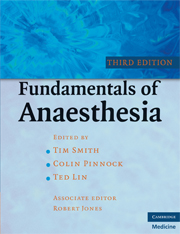Book contents
- Frontmatter
- Contents
- List of contributors
- Preface to the first edition
- Preface to the second edition
- Preface to the third edition
- How to use this book
- Acknowledgements
- List of abbreviations
- Section 1 Clinical anaesthesia
- Section 2 Physiology
- 1 Cellular physiology
- 2 Body fluids
- 3 Haematology and immunology
- 4 Muscle physiology
- 5 Cardiac physiology
- 6 Physiology of the circulation
- 7 Renal physiology
- 8 Respiratory physiology
- 9 Physiology of the nervous system
- 10 Physiology of pain
- 11 Gastrointestinal physiology
- 12 Metabolism and temperature regulation
- 13 Endocrinology
- 14 Physiology of pregnancy
- 15 Fetal and newborn physiology
- Section 3 Pharmacology
- Section 4 Physics, clinical measurement and statistics
- Appendix: Primary FRCA syllabus
- Index
12 - Metabolism and temperature regulation
from Section 2 - Physiology
- Frontmatter
- Contents
- List of contributors
- Preface to the first edition
- Preface to the second edition
- Preface to the third edition
- How to use this book
- Acknowledgements
- List of abbreviations
- Section 1 Clinical anaesthesia
- Section 2 Physiology
- 1 Cellular physiology
- 2 Body fluids
- 3 Haematology and immunology
- 4 Muscle physiology
- 5 Cardiac physiology
- 6 Physiology of the circulation
- 7 Renal physiology
- 8 Respiratory physiology
- 9 Physiology of the nervous system
- 10 Physiology of pain
- 11 Gastrointestinal physiology
- 12 Metabolism and temperature regulation
- 13 Endocrinology
- 14 Physiology of pregnancy
- 15 Fetal and newborn physiology
- Section 3 Pharmacology
- Section 4 Physics, clinical measurement and statistics
- Appendix: Primary FRCA syllabus
- Index
Summary
Nutrition
Food provides basic energy requirements, and provides the structural building blocks to maintain metabolic integrity. A normal diet consists of carbohydrates, proteins and fats. In addition, small quantities of vitamins and minerals are also required for good health. Nutritional status may be assessed by measurement of skin-fold thickness with callipers (the area overlying the triceps muscle is often used) or by calculation of the body mass index (BMI). BMI is obtained by dividing weight (kg) by the square of the height (m2). Values between 20 and 24 are normal, with >30 indicating obesity and >40 severe obesity. BMI is also called Quetelet's test after Adolphe Quetelet (1796–1874), a Belgian mathematician who came up with the concept of the ‘average’ man.
The average calorific requirement for 24 hours in a fit 70 kg man is about 3000 kcal, but this varies greatly with occupation.
Carbohydrates
Dietary carbohydrates may be in the form of simple or complex carbohydrates. Complex carbohydrates, mainly plant starches, are acted upon by salivary amylase, to produce oligosaccharides. The intestinal mucosa secretes maltase, lactase and sucrase to complete the conversion of these oligosaccharides to simple hexoses. The products of carbohydrate digestion are rapidly absorbed in the small intestine. Pentoses are absorbed by diffusion, although glucose utilises a sodium-driven active transport mechanism, with a limit of around 120 g per hour. The average daily requirement of carbohydrate for an adult is between 5 and 10 g kg−1.
- Type
- Chapter
- Information
- Fundamentals of Anaesthesia , pp. 448 - 465Publisher: Cambridge University PressPrint publication year: 2009



